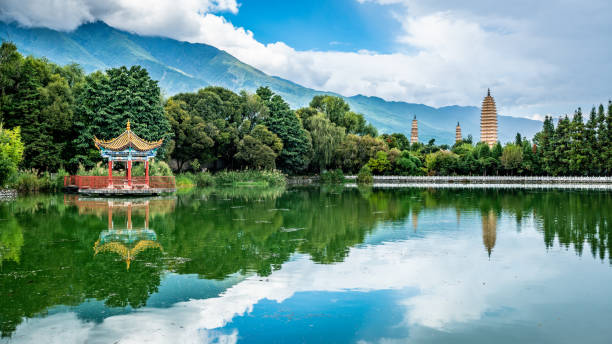1. 🌸 Introduction to Dali, China
Nestled between the serene waters of Erhai Lake and the majestic Cangshan Mountains, Dali (大理) is one of Yunnan Province’s most beloved destinations. Known for its slow pace of life, traditional Bai minority culture, and stunning natural landscapes, Dali is a place where ancient charm and modern ease meet effortlessly. Whether you’re exploring centuries-old towns, sipping Pu’er tea in a local courtyard, or cycling through golden rice fields along the Erhai Ecological Corridor, Dali offers an experience both grounding and inspiring.
Dali has long been a haven for poets, artists, and free spirits—both local and foreign. The blend of natural beauty, deep cultural roots, and a laid-back lifestyle makes it an ideal destination for travelers seeking authenticity, tranquility, and adventure in one package.
Once a kingdom in its own right during the Nanzhao and Dali periods, the city has preserved its architectural heritage and traditional way of life, making it not just a scenic spot, but also a living piece of Chinese history. With convenient access via air and high-speed rail, Dali is the perfect gateway to deeper exploration of Yunnan’s wonders.
2. ✈️ Getting to Dali
Dali is well-connected by both air and rail, making it easy to include in your Yunnan itinerary. Whether you’re flying in directly or arriving by train from another city, getting to this scenic destination is smoother than ever.
🛬 Dali Airport (DLU)
Dali Airport, located about 13 km east of Dali Old Town, handles domestic flights to and from major Chinese cities such as Kunming, Chengdu, Chongqing, Guangzhou, and Shanghai. Though relatively small, the airport is efficient and traveler-friendly.
Airport Transport Options:
- Taxi: 30–40 minutes to Dali Old Town (~¥60)
- Airport Shuttle: Available but limited—check times locally
- Private Transfer: Recommended for convenience, especially with luggage
🚄 High-Speed Train to Dali
The Dali Railway Station is served by China’s growing high-speed rail network, making train travel fast and scenic.
Popular Train Routes:
- Kunming → Dali: ~2–2.5 hours (Multiple daily departures)
- Lijiang → Dali: ~1.5–2 hours
- Shangri-La → Dali ~4–4.5 hours
The railway station is located in the new town area, about 25–30 minutes by taxi or public bus from Dali Old Town.
🚍 Long-Distance Buses
For budget travelers or those exploring deeper rural areas, long-distance buses still operate routes from:
- Kunming (Western Bus Station) – ~5 hours
- Lijiang – ~3 hours
- Shaxi and Weishan – ~1–2 hours
🚗 Private Car or Self-Drive
Renting a car or hiring a driver is popular among travelers who prefer flexibility, especially if you plan to visit places like Shaxi, Erhai villages, or the Cangshan scenic area at your own pace.
Tip: A Chinese driving license is required to rent a car. International permits are not accepted without local conversion.
3. 🚲 Getting Around Dali
Dali offers a relaxed, flexible way to explore—whether you’re wandering the cobblestone streets of ancient towns, biking along Erhai Lake, or catching a bus to nearby villages. The city is small enough to feel personal but big enough to offer diverse options for getting around.
🚌 Public Transport in Dali
Dali’s public transport system is affordable, reliable, and eco-friendly, especially in the new town areas and around Dali Old Town.
- City Buses: Operated throughout the Dali region, these buses connect Dali Old Town, the train station, the new town, and nearby villages like Caicun and Xizhou. Fares usually range from ¥1–3.
- Bus to Tourist Spots: Look for special tourism routes heading to major attractions such as the Three Pagodas, Cangshan Mountain cable car station, and lakeside parks. Timetables are posted in Chinese but are easy to understand with translation apps.
- WeChat Mini Programs & Apps: Buses can be tracked using Chinese apps like Amap (Gaode) or WeChat travel tools. Most routes are punctual.
🚖 Taxis & Ride-Hailing
Taxis are easy to flag down in the city, though they are less frequent in Old Town or rural areas. Most drivers do not speak English, so it’s helpful to have your destination written in Chinese.
- Flag-down fare: Starts at around ¥8
- Tip: Always ask the driver to use the meter (“请打表 qǐng dǎ biǎo”) or use apps to avoid overcharging.

Ride-hailing apps like DiDi (China’s version of Uber) are widely used in Dali and are often more convenient than hailing a taxi, especially for non-Chinese speakers.
🚲 Bicycles & E-Bikes
One of the most enjoyable ways to explore Dali is on two wheels—especially around Erhai Lake.
🚴 Bicycle Rental:
- Available in Dali Old Town, Caicun Village, and tourist hotspots.
- Types: Standard bikes, mountain bikes, and tandem bikes.
- Cost: Around ¥20–¥50 per day, depending on the type and duration.
⚡ E-Bike Rental:
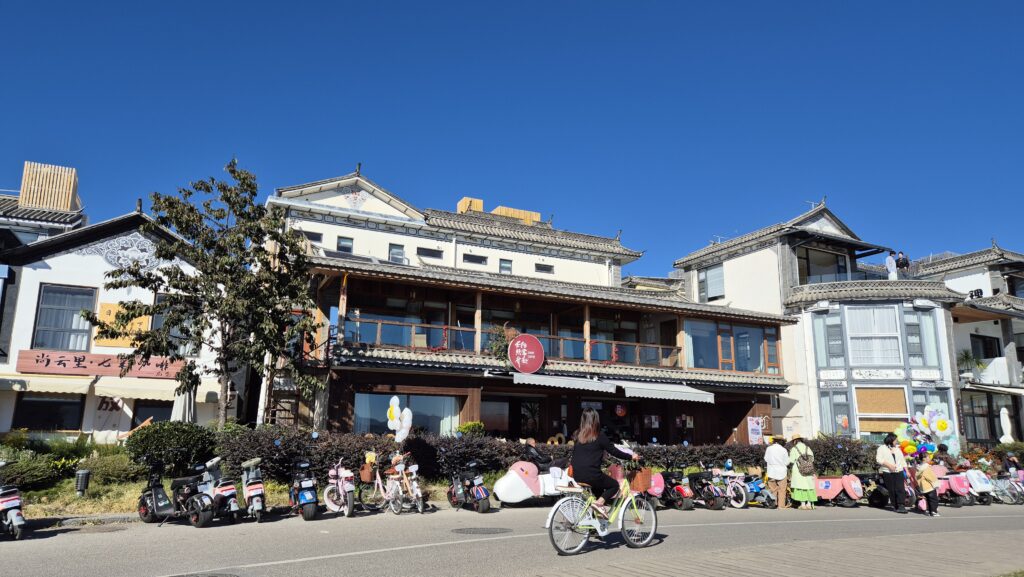
- Great for covering longer distances along the Erhai Ecological Corridor.
- Rental shops offer e-bikes with a range of ~30–50km.
- Rental Cost: ¥80–¥150/day (ID or deposit usually required)
- Tip: Drive carefully—helmets are not always provided, and roads can be narrow.
Recommended E-bike route:
Dali Old Town → Caicun → Erhai Ring Road → Xizhou Ancient Town → Return via country lanes (40–50km round trip)
🚶 Walking
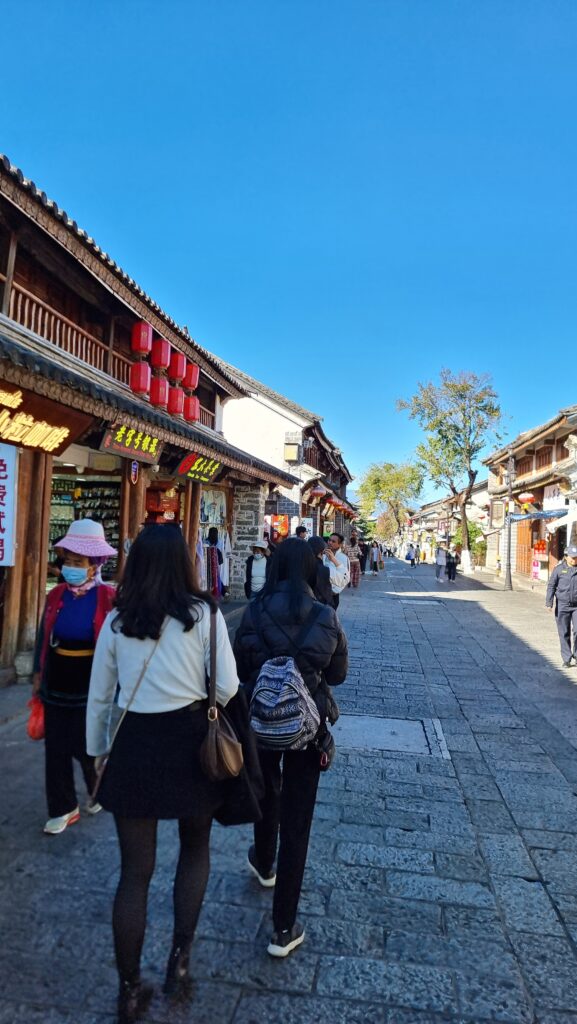
Dali Old Town is best explored on foot, with its stone-paved streets, traditional Bai architecture, small shops, and local cafés. Walking lets you slow down, absorb the atmosphere, and stumble upon hidden courtyards or temples.
- Walking Distance Tips:
- Old Town main street = ~1.5 km long
- From South to North Gate = ~30–40 minutes walk
- From Old Town to Erhai Lake = ~15-minute walk to Caicun Pier
🚗 Car Rentals & Private Drivers
If you’re planning to explore more remote areas like Shaxi, Weishan, or Cangshan’s west slope, a private car or rental may be ideal.
- Private Car with Driver: Book through hotels, tour agencies, or platforms like Klook and Trip.com. Drivers often include basic guiding services.
- Day trip: ¥400–¥700 depending on distance
- Self-Drive Car Rental:
- Must hold a valid Chinese driver’s license
- Recommended for experienced drivers only
- Useful for multi-day trips around Yunnan
🚡 Cangshan Cable Cars & Tourist Transport

To reach the higher altitudes of Cangshan Mountain, three main cable car lines are available:
- Gantong Cable Car (southern route)
- Zhonghe Cable Car (mid-point panoramic trail)
- Ximatan Cable Car (highest altitude access)
These offer spectacular views of Dali and Erhai Lake, and reduce hiking strain—especially useful if you’re short on time.
🛶 Scenic Boat Rides on Erhai Lake
While not a core transport method, cruise boats and small ferries offer a unique view of Dali from the water. Tours typically depart from Caicun and go to spots like Jinsuo Island or Xizhou Bay.
- Prices: ¥80–¥200 depending on route and boat type
- Tip: Morning rides often offer calmer waters and better light for photography
✅ Summary Tips
| Mode | Best For | Estimated Cost |
|---|---|---|
| Bus | Budget travel, local commuting | ¥1–¥3 |
| Taxi/DiDi | Short distances, door-to-door comfort | ¥8–¥50+ per trip |
| E-bike | Exploring Erhai, nearby towns | ¥80–¥150/day |
| Bicycle | Leisurely lake rides, eco-tourism | ¥20–¥50/day |
| Walking | Old Town, scenic strolls | Free! |
| Car/Driver | Remote trips, flexible travel | ¥400–¥700/day |
4. 🌤️ Weather and Best Time to Visit Dali
Often referred to as having “four seasons in one day”, Dali enjoys a pleasant subtropical highland climate. Thanks to its elevation (~1,970 meters above sea level), the weather remains mild and spring-like year-round, making it a great destination in any season.
🌸 Spring (March – May)
Temperature: 10°C – 22°C
Weather: Mild, sunny, and dry
Spring in Dali is fresh and floral, with blooming cherry blossoms, wildflowers across the Cangshan hills, and vibrant rice paddies coming back to life. It’s an ideal time for hiking, photography, and cycling around Erhai Lake.
Travel tip: Early spring is less crowded, especially before the May Day holiday.
☀️ Summer (June – August)
Temperature: 16°C – 26°C
Weather: Warm with occasional rain
Summer brings lush greenery, longer daylight hours, and refreshing lake breezes. While the rainy season peaks in July and August, showers are usually short-lived and occur in the evening or at night.
Best for: Water views, boat rides, cultural festivals like the Bai “March Fair”
Tip: Bring light layers and a rain jacket—days are warm, but evenings cool quickly.
🍁 Autumn (September – November)
Temperature: 12°C – 24°C
Weather: Dry, clear skies, colorful landscapes
This is Dali’s golden season. The weather is stable and crisp, skies are deep blue, and the hills and farmlands glow with autumn colors. It’s the best time for trekking on Cangshan and visiting villages like Shaxi and Xizhou.
Travel tip: October is especially beautiful, but it can be busy during the National Day holiday week (the first week of October).
❄️ Winter (December – February)
Temperature: 4°C – 16°C
Weather: Cool, dry, with bright sunshine
Winter in Dali is gentle and bright, unlike the snowy winters of northern China. While mornings and nights can be chilly, days are sunny and comfortable. This is the quietest season—ideal for peaceful, crowd-free exploration.
Best for: Photography, hot tea in cozy cafés, off-season pricing
Tip: Bring a warm jacket for nights, especially if staying near the lake.
📅 Best Time to Visit Overall
| Season | Pros | Cons |
|---|---|---|
| Spring | Flowers blooming, mild weather | Slightly cool evenings |
| Summer | Greenest landscapes, local festivals | Occasional rain, more tourists |
| Autumn | Clear skies, rich colors, ideal hiking | Higher hotel prices in early Oct |
| Winter | Fewer crowds, budget-friendly | Cooler temperatures, shorter days |
🧳 What to Pack by Season

- Year-round must-haves: Sunscreen, sunglasses, good walking shoes, light jacket
- Spring/Autumn: Light sweaters, windbreaker, scarf
- Summer: Umbrella, light breathable clothes, mosquito repellent
- Winter: Warm layers, gloves, thermals for mountain trips
🌞 UV Index & Altitude Tips
Dali’s altitude means the sun is strong even on cool days. Use high-SPF sunscreen, stay hydrated, and wear a hat if hiking or biking. Also, give yourself a day to acclimate if you’re coming from sea level.
5. 🏯 Dali’s Rich Culture and Local Life
Dali is more than just scenic beauty—it’s a cultural mosaic steeped in history, traditions, and artistic expression. As the heartland of the Bai ethnic minority, Dali offers travelers a glimpse into a unique way of life that blends ancient wisdom with contemporary flair.
👘 The Bai People: Heart of Dali’s Identity
The Bai people (白族) make up over 60% of Dali’s population. Known for their distinctive white and blue clothing, elaborate festivals, and reverence for nature, the Bai have shaped Dali’s culture for centuries.
Key Bai Traditions:

- Three-Course Tea Ceremony (三道茶): A symbolic ritual where three teas—bitter, sweet, and reflective —are served to represent the stages of life. Often accompanied by song and dance.
- Tie-Dyeing (扎染): A beautiful handicraft tradition, especially preserved in Zhoucheng Village, where artisans create intricate blue-and-white patterns using natural indigo.
- Folk Architecture: Whitewashed houses with dark tile roofs, carved wooden beams, and colorful wall paintings—often featuring dragons, flowers, or auspicious symbols.
🏘️ Daily Life in Dali Old Town
Life in Dali Old Town (大理古城) moves at a peaceful, almost poetic pace. You’ll see locals playing cards under shady trees, sipping tea in courtyard cafés, or selling handwoven crafts in alleyways. Traditional markets bustle with life every morning, while evenings bring lanterns, music, and open-air performances.
Don’t Miss:
- Morning markets: A lively look into local food, herbs, and produce
- Tea Houses: Try local Pu’er or rose tea while chatting with friendly shopkeepers
- Courtyard Guesthouses: Many are converted from old Bai homes—staying in one offers a truly immersive experience
🎉 Festivals & Celebrations
Dali hosts several vibrant festivals that reflect its cultural richness:
🌿 March Fair (三月街):
Held every spring near the Three Pagodas, this is Dali’s largest traditional event. It’s a mix of market fair, horseback competitions, folk performances, and Bai cuisine, dating back over 1,000 years.
🦋 Butterfly Festival:
Linked to the legend of lovers turned butterflies, this festival celebrates love, music, and nature. Locals wear colorful costumes, dance, and sing near Butterfly Spring.
🔥 Torch Festival:
Popular among the Yi and Bai communities, this midsummer event includes torch parades, bonfires, and wrestling contests, believed to drive away evil spirits.
🖌️ Arts, Music & Creativity
Dali has become a haven for artists, musicians, writers, and free spirits, both Chinese and international. Small galleries, live music bars, craft studios, and creative markets pop up all around Old Town and Erhai’s villages.
- Xizhou & Shaxi: Home to workshops and cultural preservation centers
- Art Cafés: Blend modern design with Bai heritage
- Live Music: Nightlife in Old Town features indie bands, folk musicians, and chill rooftop DJ sets
🧘♀️ Spiritual & Philosophical Life
Dali’s spiritual landscape is as diverse as its culture. You’ll find Buddhist temples, Daoist shrines, and even Christian churches, a legacy of missionary contact in the early 20th century.
- Chongsheng Temple & Three Pagodas: A major site of ancient Buddhist learning
- Small Temples on Cangshan Slopes: Quiet, mystical, and perfect for reflection
- Morning Tai Chi in Parks: A daily ritual shared by locals and visitors alike
👪 Hospitality and Local Attitude
What stands out most in Dali is the warmth and hospitality of its people. Whether it’s a vendor handing you a sample of rose cake, a guesthouse owner sharing stories over tea, or a farmer waving from his field, Dali’s locals make you feel more like a welcomed guest than a tourist.
6. 🏞️ Top Places to Visit in Dali
From ancient architecture and spiritual landmarks to stunning lake views and mountain trails, Dali offers a rich blend of history, nature, and local life. Here’s a list of the most popular and rewarding places to explore.
6.1. 🏯 Dali Old Town (大理古城)
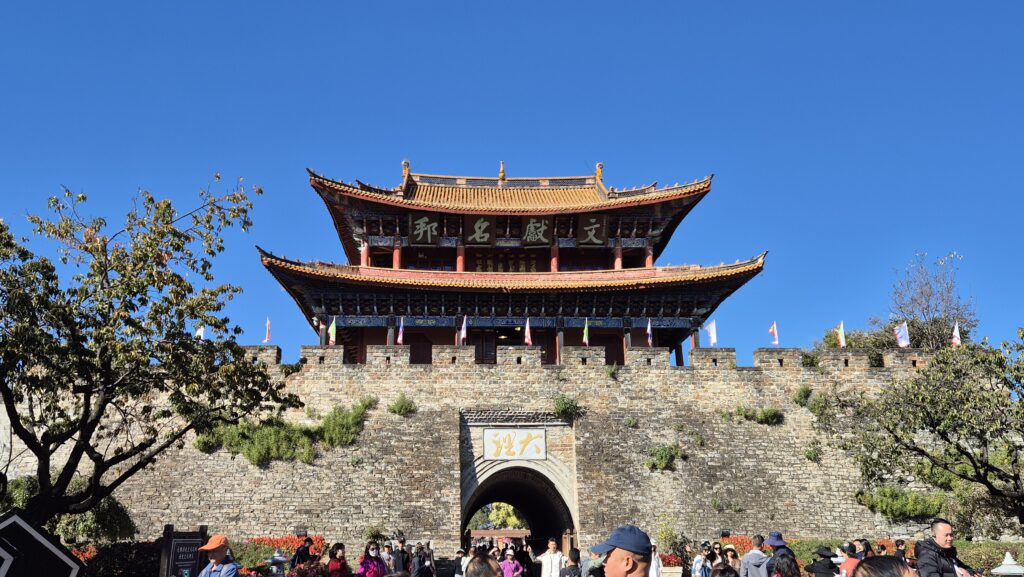
The heart of the city, Dali Old Town, is where time slows down. Walk its stone-paved streets, admire traditional Bai architecture, sip tea in hidden courtyards, and shop for tie-dye, silver jewelry, and handmade crafts.
Highlights:
- South and North Gates
- Renmin Road & Foreigner Street
- Ancient city walls and watchtowers
- Charming bookstores, cafés, and art galleries
Best For: Strolling, shopping, café hopping, and people-watching.
6.2. 🛕 Three Pagodas and Chongsheng Temple (崇圣寺三塔)

An iconic symbol of Dali, the Three Pagodas are over 1,200 years old and once formed the religious center of the ancient Nanzhao Kingdom.
What to Expect:
- A dramatic arrangement of three ancient pagodas
- Grand Chongsheng Temple behind them, with terraces of golden statues and incense
- Panoramic views of Dali and Erhai Lake
Tip: Go early to avoid crowds and catch the best morning light.
6.3. 🌊 Erhai Lake (洱海)
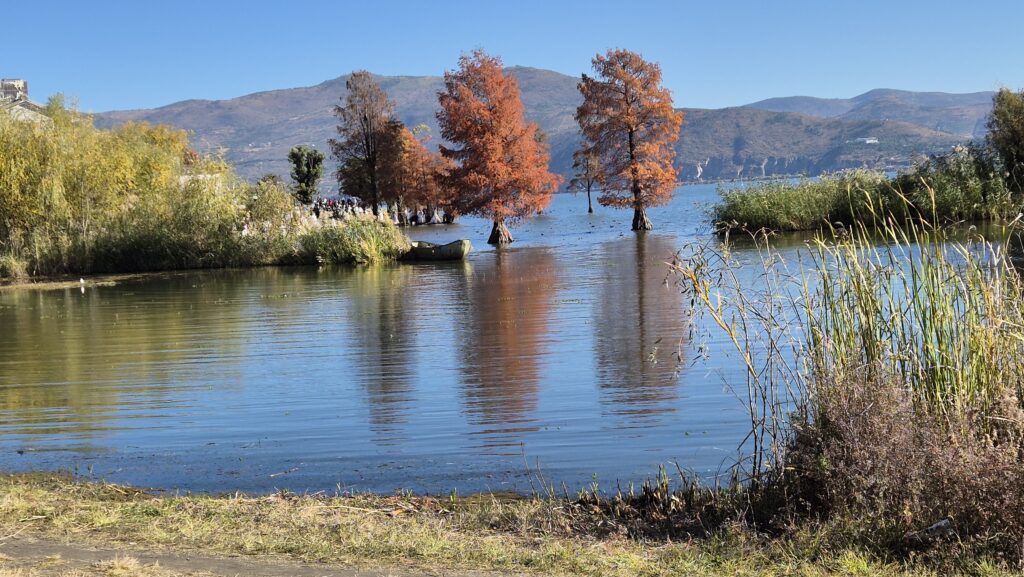
Known as the “ear-shaped sea,” Erhai is a vast alpine lake stretching alongside Dali Old Town. It’s a must-see for nature lovers, photographers, and cyclists.
Top Activities:
- Cycle or e-bike the Erhai Ecological Corridor
- Visit fishing villages like Caicun and Shuanglang
- Take a boat ride to Jinsuo Island
- Watch a sunrise or sunset from the lakeshore
6.4. 🏔️ Cangshan Mountain (苍山)
Rising behind Dali Old Town, Cangshan Mountain offers hiking, cable car rides, and scenic trails with epic views of Erhai Lake.
Things to Do:
- Ride the Zhonghe or Gantong cable car
- Hike the Cloud Traveler’s Path (玉带路) — a flat trail along the ridgeline
- Explore ancient temples and hidden waterfalls
Tip: Bring layers—it gets cooler as you ascend.
6.5. 🏘️ Xizhou Ancient Town (喜洲古镇)
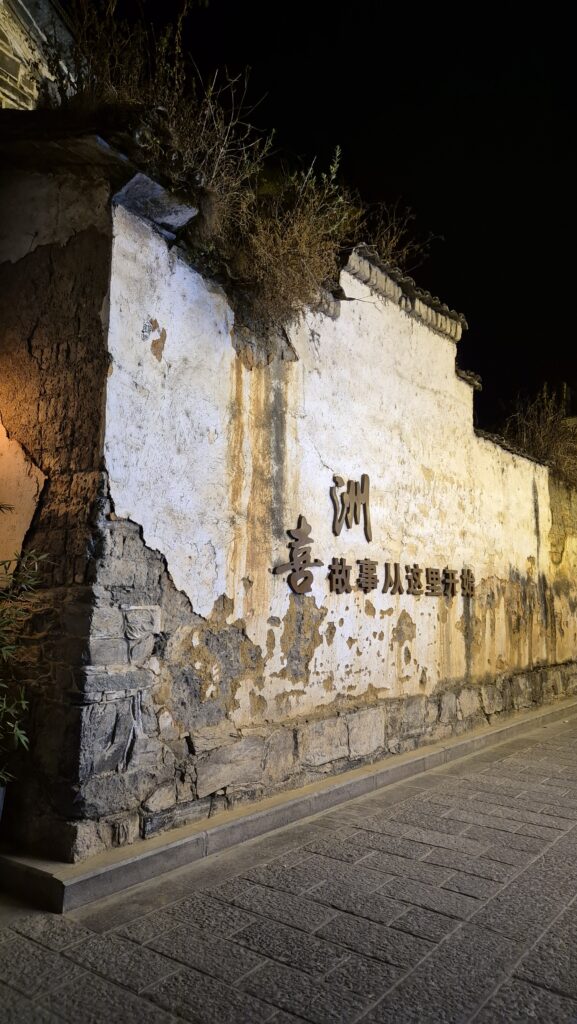
Located 18 km north of Dali, Xizhou is a well-preserved Bai town known for its elegant courtyard homes, daily market, and deep-rooted traditions.
Don’t Miss:
- Morning wet market
- Bai-style architecture with painted walls
- Local specialty: Xizhou Baba (Bai-style savory flatbread)
Tip: Go early in the morning to enjoy the market buzz and quieter streets.
6.6. 🌀 Zhoucheng Village (周城村)
This charming village is the center of Bai tie-dye arts. Visit family-run workshops to see how natural indigo dyeing is done using age-old methods.
Experiences:
- Join a DIY tie-dye workshop
- Talk to artisans about traditional craft techniques
- Purchase beautiful scarves and clothes directly from the source
6.7. 🌉 Langqiao (朗桥)
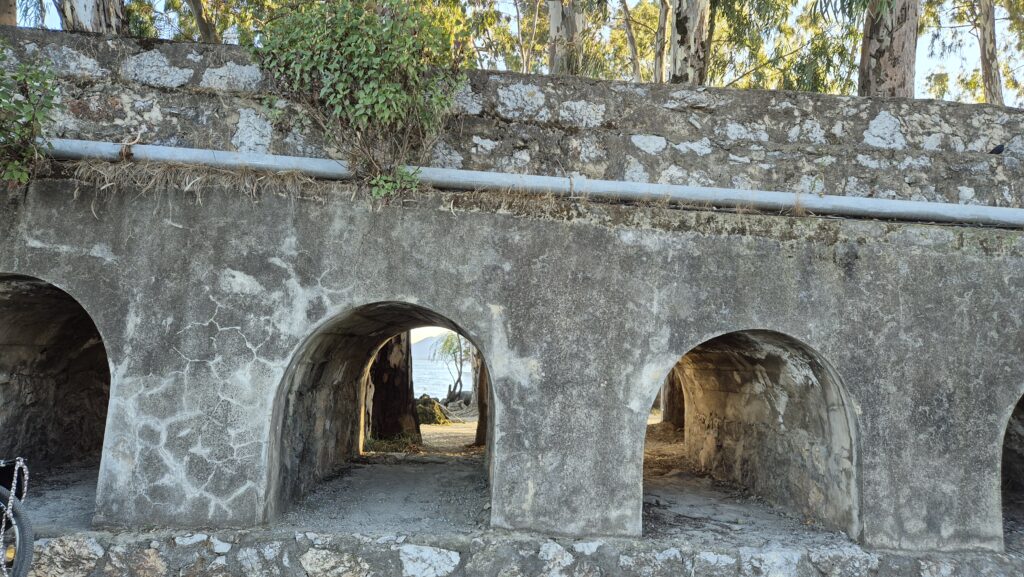
Langqiao, meaning “Wave Bridge,” is a picturesque spot along the Erhai lakeside, known for its traditional Bai homes, lakeside cafés, and photo-perfect wooden docks.
Best For: Quiet lake views, sunset strolls, and Instagram-worthy shots
6.8. 🦋 Butterfly Spring (蝴蝶泉)
Famous in folklore, this tranquil spring surrounded by trees and stone pavilions is a symbol of love and transformation. In spring, real butterflies flock to the area.
Features:
- Peaceful park setting
- Butterfly-themed artwork and performances
- Romantic legend of the Butterfly Lovers
6.9. 🌾 Shaxi Ancient Town (沙溪古镇)
About 2 hours from Dali, Shaxi is a hidden gem, once part of the Tea Horse Road. It’s a sleepy, beautifully preserved village with cobbled streets and a rich history.
Must-See:
- Sideng Square and the ancient theater
- Friday Market
- Hiking to Shibaoshan grottoes and temples
6.10. 🏯 Weishan Ancient Town (巍山古城)
Another off-the-beaten-path treasure, Weishan is the birthplace of the Nanzhao Kingdom and offers an authentic, untouristy look into Yunnan’s history.
Why Visit:
- Intact Ming-Qing dynasty town layout
- Daoist temples and old city gates
- Local street food and a slower pace
7. 🍽️ What to Eat in Dali
Dali’s cuisine is a flavorful blend of Bai ethnic traditions, Yunnan’s rich agricultural bounty, and a touch of international influence from its laid-back, artsy community. Expect bold spices, fresh herbs, wild mushrooms, and dishes that reflect both mountain and lakeside living.
7.1. 🥟 Must-Try Local Dishes
🌾 Xizhou Baba (喜洲粑粑)

A beloved local flatbread with a crisp, golden crust.
- Savory version: filled with minced pork, scallions, and chili
- Sweet version: stuffed with rose petals, brown sugar, and sesame
Where to try: Street vendors in Xizhou or Dali Old Town.
🐟 Erhai Grilled Fish (洱海烤鱼)
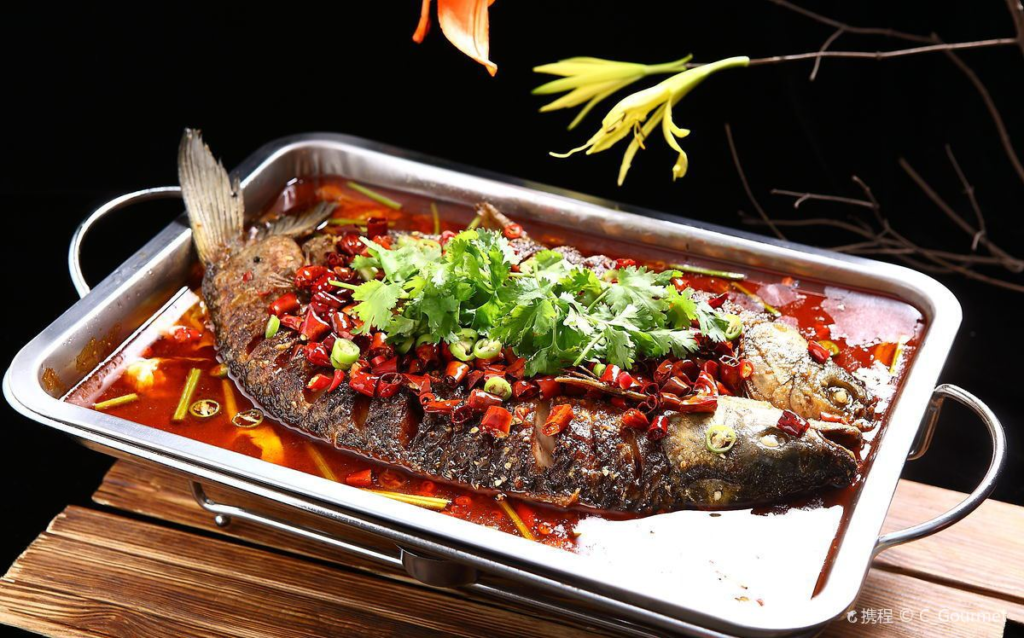
Fresh fish from Erhai Lake grilled with Yunnan spices, garlic, and wild herbs. Served sizzling hot and perfect with a side of rice.
Popular types: Carp, catfish, or bass.
🧄 Bai Three-Course Tea (白族三道茶)
More than a drink, this is a ceremonial experience.
- First tea: Bitter (life’s hardship)
- Second tea: Sweet (love and reward)
- Third tea: Reflective (aftertaste of life)
Often enjoyed with Bai music and storytelling performances.
🍲 Rushan Cheese (乳扇)
A unique Yunnanese cheese made from cow’s milk. It’s stretched into thin sheets, grilled or fried, and often served with sugar or rose jam.
Texture: Chewy and lightly crispy—an addictive street snack!
🍄 Wild Mushroom Hotpot (野生菌火锅)

Yunnan is famous for its wild mushrooms, especially in summer. You’ll find dozens of varieties in a single pot, from porcini to matsutake.
Tip: Always go with a knowledgeable local or licensed restaurant—some mushrooms are toxic if not cooked properly.
🌿 Mint Salad with Local Greens (凉拌薄荷)
A refreshing side dish of fresh mint, cucumber, and local herbs tossed in vinegar, chili, and sesame oil. It’s cooling and packs a punch.
7.2. 🥗 Vegetarian and Vegan Options
Thanks to local herbs, tofu, wild greens, and mushrooms, Dali is friendly to plant-based travelers.
- Stir-fried fern root (蕨菜)
- Grilled eggplant with garlic and chili
- Braised tofu with Yunnan mushrooms
- Herbal vegetable soups
Many restaurants also cater to vegetarian Buddhist diets, especially near temples or in art cafés around Erhai.
7.3. 🍰 Snacks, Sweets & Street Food
🌹 Rose Petal Pastry (玫瑰饼)

A Dali specialty made with sweet rose jam wrapped in flaky pastry. Soft, fragrant, and perfect with tea.
🍡 Sticky Rice Balls (糯米团子)
Stuffed with black sesame or sweet red bean, these are a popular snack at street markets.
🧊 Ice Jelly with Hawthorn & Osmanthus (桂花山楂冰粉)
A cooling treat on hot days—served in small bowls at roadside stalls.
7.4. ☕ Cafés & International Eats
Because of Dali’s backpacker vibe and international community, you’ll also find cozy cafés, vegan spots, and fusion restaurants serving:
- Western breakfasts
- Israeli falafel wraps
- Thai curries
- Italian pasta with Yunnan mushrooms
- Locally roasted coffee from Pu’er beans
7.5. 🍺 Local Drinks

- Dali Beer (大理啤酒): Crisp and easy to drink, brewed locally.
- Rose Wine (玫瑰酒): Sweet and floral, sometimes served in small teacups.
- Yunnan Coffee: Grown in nearby Pu’er and Baoshan—smooth, rich, and aromatic.
- Fruit Tea: Infused with fresh passionfruit, hawthorn, and herbs.
7.6. 🛒 Food Markets Worth Visiting
- Dali Old Town Morning Market: Fresh produce, local snacks, and bustling with life.
- Xizhou Market: Great for experiencing authentic Bai ingredients.
- Caicun Fishing Village: Fresh lake fish, pickled vegetables, and seafood condiments.
8. 🛍️ Where to Shop in Dali
Shopping in Dali is about more than just picking up souvenirs—it’s a cultural experience. From hand-dyed fabrics and ethnic jewelry to local teas and traditional snacks, the markets and boutiques here are full of treasures that tell the story of Bai heritage and Dali’s artistic soul.
8.1. 🎨 Local Handicrafts and Artisan Goods
Dali is famous for its vibrant arts scene, with many items handmade by local Bai and other ethnic minority communities.
🌀 Bai Tie-Dye (扎染)

One of Dali’s most iconic crafts, created using natural indigo dyes and intricate binding techniques.
- Scarves, shirts, bags, and wall hangings
- Where to buy: Zhoucheng Village (best for authentic goods) or Old Town artisan shops
- Many studios offer DIY workshops so you can make your own piece!
💍 Silver Jewelry
Bai and Yi communities are skilled silversmiths. Their jewelry often features dragons, phoenixes, and peonies—symbols of blessing and beauty.
- Find silver earrings, bracelets, hairpins, and rings
- Available in artisan stalls in Dali Old Town and weekend craft fairs
🏮 Paper Lanterns & Wood Carvings
Hand-painted lanterns, woodblock prints, and finely carved boxes are popular keepsakes from the region.
Tip: Look for small studios around Renmin Road and Foreigner Street in Dali Old Town.
8.2. ☕ Local Specialty Products
🌹 Dali Rose Products
Dali’s roses are not just beautiful—they’re edible!
- Rose jam, rose tea, and rose pastries (like rose cakes, 玫瑰饼)
- Look for local brands or buy directly from bakeries and herbal shops
🍄 Yunnan Mushrooms
Packaged dried porcini, matsutake, or black truffles are great edible souvenirs.
- Make sure they are well-sealed and labeled for travel
🍃 Pu’er and Yunnan Tea
Dali is near some of China’s best tea-growing regions.
- Try aged Pu’er tea, chrysanthemum, or rose tea
- Where to buy: Old Town teahouses, Shaxi tea markets, or directly from tea farms
8.3. 🧺 Markets and Shopping Streets
🏘️ Dali Old Town Markets
- Morning Market: Fresh produce, snacks, local goods
- Night Market (Renmin Rd): Handmade crafts, jewelry, leatherwork, vintage clothes
- Foreigner Street: Great for unique clothing, art prints, and secondhand treasures
🏡 Xizhou Market
A bustling local spot with fabrics, dried goods, herbs, and street food. Less touristy, more authentic.
🛍️ Shaxi Friday Market
A lively traditional market that brings in vendors from nearby villages. Expect spices, handwoven baskets, and medicinal herbs.
8.4. 🖼️ Art Galleries and Indie Boutiques
Dali is home to a growing number of independent designers, ceramicists, and painters.
- Slow Art & Café Spaces: Mix art exhibitions with handmade journals, clothing, and stationery
- Erhai Lakeside Shops: Small boutique stalls in Shuanglang and Caicun sell everything from hand-thrown pottery to vintage cameras
8.5. 💼 What to Take Home
Top Recommended Souvenirs:
- Hand-dyed indigo scarves or clothing
- A pack of aged Pu’er tea or rose tea
- Dried wild mushrooms (vacuum-packed)
- Silver Bai-style jewelry
- Rose jam or rose cake
- Small paper lantern or wood carving
Where to Stay in Dali, China
Dali offers a diverse range of accommodations suited to every traveler’s style — from charming boutique inns nestled in the ancient town to lakeside resorts with breathtaking views of Erhai Lake. Whether you’re seeking culture, comfort, or scenic tranquility, here’s a guide to the best areas and lodging options in Dali.
1. Best Areas to Stay
a. Dali Ancient Town (Dali Old Town)
- Ideal for: First-time visitors, culture lovers, history buffs
- Why Stay Here: Cobblestone streets, Bai architecture, traditional shops, and easy access to landmarks like the Three Pagodas and Cangshan Mountain.
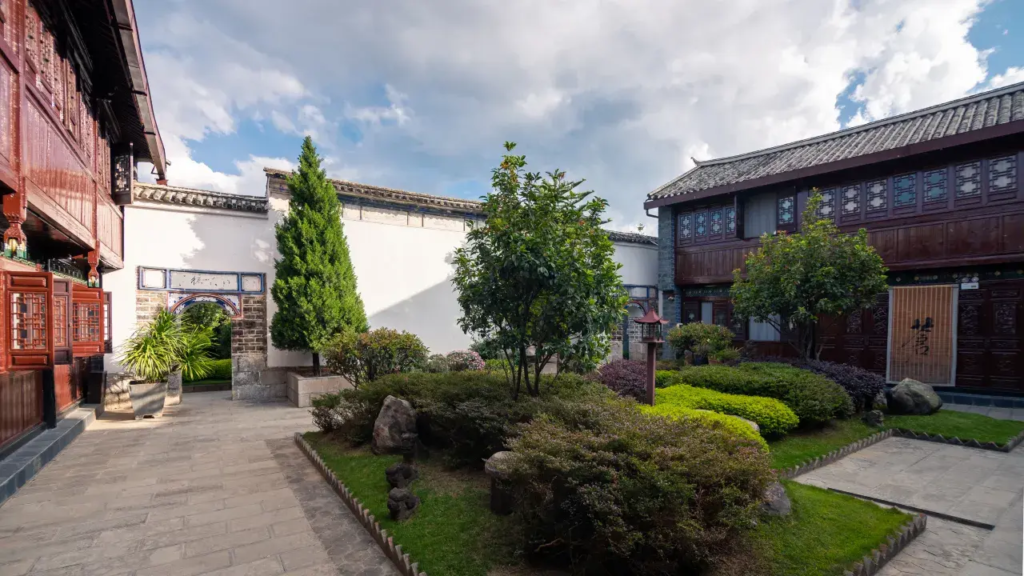
- Recommended Stays:
- The Linden Centre – A beautifully restored Bai courtyard mansion blending history and comfort.
- Dali Five Elements Hostel – Popular among backpackers for its affordability and atmosphere.
- Jim’s Tibetan Hotel – Known for its peaceful setting and rooftop views.
b. Caicun Village (Near Erhai Lake West Shore)
- Ideal for: Nature lovers, photographers, cyclists
- Why Stay Here: A quieter alternative with stunning views of Erhai Lake, ideal for sunrise lovers and bike rides along the lakeside path.
- Recommended Stays:
- Blue Sea Resort Erhai – A modern lakeside escape with panoramic windows.
- Sky Valley Heritage Boutique Hotel – Offers heritage design and serene surroundings.
c. Shuanglang Town (East Shore of Erhai Lake)
- Ideal for: Romantic getaways, luxury stays
- Why Stay Here: A trendy lakefront village known for luxury guesthouses, art cafes, and stylish boutique hotels.
- Recommended Stays:
- Yunxi Boutique Seaview Hotel – Spectacular lake views and minimalist design.
- The Sea in Heart Boutique Hotel – Romantic setting with terraces over the water.
d. Xiaguan (New Dali City)
- Ideal for: Business travelers, transport convenience
- Why Stay Here: Close to the Dali Railway Station and airport, with a more modern urban layout.
- Recommended Stays:
- Hilton Garden Inn Dali – International-standard hotel with great service.
- Landscape Hotel Xiaguan – Comfortable and conveniently located.
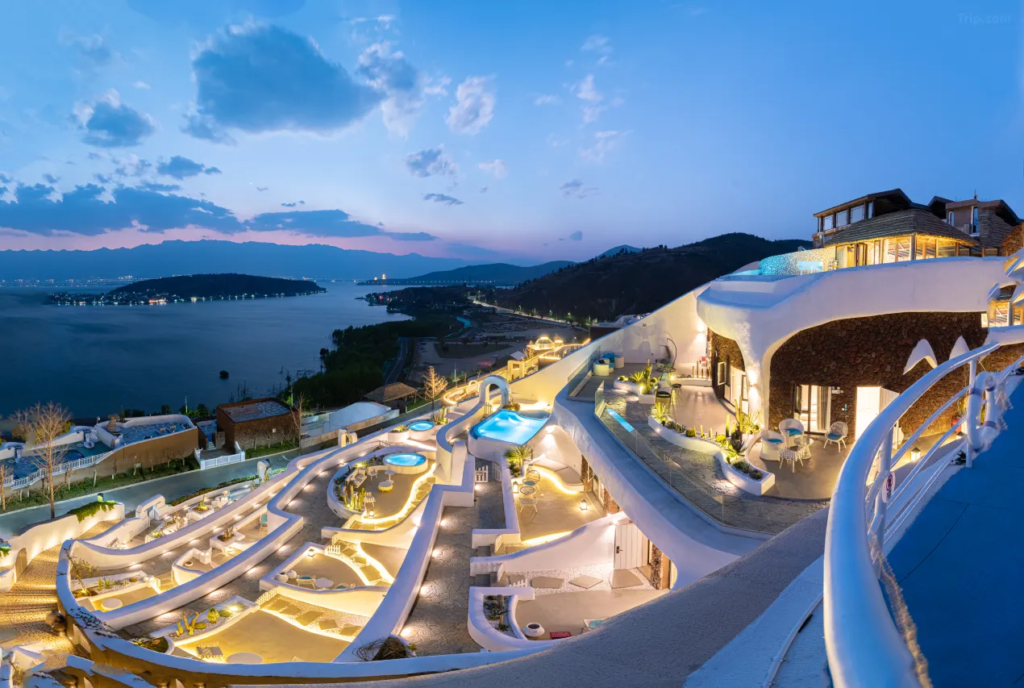
Stay in Santorini Dali: Chic Lakeside Retreat
Santorini Dali is a picturesque lakeside development located near Shuanglang Town, designed with Greek island-inspired architecture — whitewashed walls, blue domes, and incredible sunset views over Erhai Lake. It has quickly become a favorite among couples, honeymooners, and influencers looking for an aesthetically pleasing and luxurious stay.
Why Stay Here?
- Stunning, Mediterranean-style architecture beside Erhai Lake
- Premium sunset views, infinity pools, and rooftop terraces
- Close to art cafés, boutique galleries, and Shuanglang’s trendy waterfront
Recommended Accommodations:
- Santorini Seaview Hotel – Romantic design with lake-facing balconies
- Erhai Dreamland Hotel – Instagram-worthy suites, private tubs, and panoramic views
- Aegean Sea of Dali Hotel – Features white arcades, blue domes, and a resort vibe
Tip: These boutique resorts are in high demand during weekends and holidays — book early for lakefront rooms!
2. Accommodation Types
| Type | Best For | Features |
|---|---|---|
| Boutique Hotels | Couples, art lovers | Unique decor, historic settings, personalized service |
| Guesthouses (民宿) | Culture seekers | Run by locals, often in restored homes, homely atmosphere |
| Hostels | Backpackers, solo travelers | Budget-friendly, social spaces, and tour services |
| Lakeside Resorts | Relaxation, views | Panoramic Erhai vistas, modern comforts |
| Business Hotels | Short stays, transit | Reliable, close to transportation hubs |
3. Booking Tips
- Book early in peak seasons (spring, summer, national holidays) as Dali is a favorite among Chinese domestic travelers.
- Check location carefully — “Dali” can refer to the old town, new city (Xiaguan), or lakeside villages.
- Look for local homestays (minsu) for authentic cultural experiences with Bai families.
- Watch out for altitude — while not high compared to Lijiang or Shangri-La, some people feel slightly winded at 2,000m above sea level.
Final Thought
Whether you crave the charm of Dali Old Town, the serenity of Erhai Lake, or the convenience of Xiaguan, there’s a perfect spot in Dali waiting for you. With its magical mix of history, scenery, and warm hospitality, your accommodation can be much more than just a place to sleep — it’s a vital part of your journey through this unforgettable corner of Yunnan.
9.1. 🗓️ 2-Day Itinerary: Classic Dali
Perfect for a short trip to explore Dali’s highlights, including the old town, Erhai Lake, and the famous Cangshan Mountain.
Day 1:
- Morning:
- Arrive at Dali Old Town and start with a leisurely walk along Renmin Road and Foreigner Street
- Explore the ancient city gates, old architecture, and street markets
- Afternoon:
- Visit Three Pagodas and Chongsheng Temple for historical insights and panoramic views
- Enjoy lunch with a view at one of the lakeside cafés near Erhai Lake
- Evening:
- Sunset boat ride on Erhai Lake or stroll along the lakeside for quiet reflection
- Enjoy a local dinner of Erhai Grilled Fish and Xizhou Baba
Day 2:
- Morning:
- Hike or take the cable car up Cangshan Mountain for scenic views and a visit to Gantong Temple
- Take time for a photo stop at the Cloud Traveler’s Path (玉带路)
- Afternoon:
- Explore Xizhou Ancient Town for its well-preserved Bai architecture and vibrant local market
- Stop at a tea house and try traditional Bai Three-Course Tea
- Evening:
- Head back to Dali Old Town for shopping, enjoying the evening atmosphere, and trying out local street food
9.2. 🗓️ 3-Day Itinerary: In-depth Exploration
Ideal for those who want to dive deeper into Dali’s culture, history, and natural beauty.
Day 1:
- Same as Day 1 in the 2-day itinerary: Explore Dali Old Town, Three Pagodas, and Erhai Lake
- Evening:
- Enjoy a local Bai performance in the evening (traditional dances, songs, and festivals)
Day 2:
- Morning:
- Visit Shaxi Ancient Town to experience life along the ancient Tea Horse Road
- Wander the Shaxi Market and visit the ancient theater
- Afternoon:
- Head to Zhoucheng Village for a hands-on tie-dye workshop and souvenir shopping
- Lunch at a local farm-to-table restaurant
- Evening:
- Return to Dali and relax at a lakeside café or enjoy a sunset over Erhai Lake
Day 3:
- Morning:
- Explore Cangshan Mountain further with a scenic hike or a visit to Zhonghe Temple
- Afternoon:
- Stop by Langqiao (Wave Bridge) for a lakeside stroll and peaceful moments
- Head to Weishan Ancient Town for a less-visited historical site
- Evening:
- Head back to Dali and explore the quieter areas of Old Town for a relaxed evening meal
9.3. 🗓️ 4-Day Itinerary: Adventure & Nature Lover’s Dream
For those who want to get off the beaten path and enjoy outdoor activities, nature experiences, and deeper cultural immersion.
Day 1:
- Same as Day 1 in the 2-day itinerary: Visit Dali Old Town, Three Pagodas, and Erhai Lake
Day 2:
- Morning:
- Early morning visit to Cangshan Mountain for a full-day hiking adventure
- Afternoon:
- Hike the Cloud Traveler’s Path (玉带路) or explore the Baishuihe Waterfalls
- Lunch at a café along the hike
- Evening:
- Return to Dali Old Town for dinner and relax in one of its cozy cafés
Day 3:
- Morning:
- Visit Shaxi Ancient Town
- Explore Shibaoshan Grottoes—famous for its ancient Buddhist carvings and temples
- Afternoon:
- Continue exploring the area and visit local villages such as Baoxing or Shizhong for traditional crafts
- Evening:
- Stay in a rural guesthouse for a quiet and authentic experience
Day 4:
- Morning:
- Take a boat tour around Erhai Lake, visiting Jinsuo Island or the Caicun Fishing Village
- Afternoon:
- Return to Dali, exploring the local art galleries and visiting smaller villages near the lake
- Evening:
- Enjoy a farewell dinner at a lakeside restaurant, savoring local flavors and taking in the final views of the lake
9.4. 🗓️ 5-Day Itinerary: Complete Dali Experience
This itinerary is perfect for those who want to see it all—spend time exploring nature, history, food, and culture at a relaxed pace.
Day 1:
- Same as Day 1 in the 2-day itinerary: Explore Dali Old Town, Three Pagodas, and Erhai Lake
Day 2:
- Same as Day 2 in the 3-day itinerary: Explore Shaxi Ancient Town and Zhoucheng Village
Day 3:
- Same as Day 3 in the 3-day itinerary: Visit Weishan Ancient Town and Langqiao
Day 4:
- Morning:
- Hike or take a cable car up Cangshan Mountain
- Explore the ancient temples on the mountain
- Afternoon:
- Visit Xizhou Town for a cultural immersion in Bai traditions
- Evening:
- Enjoy a traditional Bai Three-Course Tea Ceremony and local dinner at a family-run restaurant
Day 5:
- Morning:
- Visit Butterfly Spring for a relaxing morning surrounded by nature
- Afternoon:
- Go for a bike ride around Erhai Lake, stopping by villages like Shuanglang and Caicun
- Evening:
- Enjoy your final sunset by Erhai Lake and a relaxed dinner by the water
These itineraries are flexible, so feel free to mix and match based on your interests! Each day allows you to experience the best of Dali’s nature, culture, and cuisine.
10. 📝 Travel Tips for Dali
Whether you’re a first-time traveler to Dali or a seasoned explorer, here are some practical tips to help you navigate the city with ease, make the most of your time, and experience its unique culture and natural beauty to the fullest.
10.1. 🚕 Transportation Tips
🛬 Getting to Dali
- By Air: Dali is served by Dali Airport (DLU), with direct flights from major Chinese cities like Kunming, Beijing, and Shanghai. From the airport, you can take a taxi (about 30–40 minutes) or a shuttle bus to Dali Old Town.
- By Train: Dali has a high-speed train station, with services from Kunming (about 2.5 hours). From the station, taxis or buses can take you to Old Town.
- By Bus: Several long-distance bus services run between Kunming and Dali, with trips taking around 5-6 hours.
🚖 Getting Around Dali
- Taxis & Ridesharing: Dali has taxis available, but they are often in high demand during peak hours. Apps like Didi (China’s Uber) are also convenient for getting around.
- Bikes & E-Scooters: Rent a bike or electric scooter to explore the scenic areas around Erhai Lake and Cangshan Mountain.
- Local Buses: The local bus system is affordable, but can be slow for tourists. It’s more convenient to hire a taxi or use Didi.
10.2. 🧳 Packing Tips
- Layered Clothing: Dali’s weather can change rapidly, especially on Cangshan Mountain. Pack light layers for the daytime and a warmer jacket for the evening.
- Comfortable Shoes: If you plan to explore the old town or hike, make sure to bring comfortable walking shoes.
- Sun Protection: Even in winter, the sun can be strong at high altitudes. Sunscreen, sunglasses, and a hat are essential, especially during outdoor activities.
- Rain Gear: If visiting during the rainy season (June–August), pack a lightweight raincoat or umbrella for short bursts of rain.
10.3. 💰 Currency & Money Tips
- Currency: The local currency is the Chinese Yuan (CNY).
- ATMs & Cash: While there are ATMs in Dali Old Town, cash is still commonly used in smaller shops or markets, so it’s good to keep some on hand.
- Digital Payments: In China, Alipay and WeChat Pay are widely used for payments in restaurants, markets, and even taxis. Download these apps before you arrive and link them to a Chinese bank account or international credit card.
- Tipping: Tipping is not common in China, and it may even be considered impolite in some places. Service charges are generally included in bills.
10.4. 🏨 Where to Stay
- Budget Travelers: Look for guesthouses or hostels in Dali Old Town or Xizhou for affordable options. These spots often offer a cozy and cultural experience, with prices around 100-200 CNY per night.
- Mid-range: For a more comfortable stay, book a boutique hotel near Erhai Lake or Cangshan Mountain. Prices typically range from 300-600 CNY per night.
- Luxury: If you’re looking for a luxury experience, consider staying in Lakeview resorts or mountain villas. Prices may range from 800-2000 CNY per night.
10.5. 🥢 Dining Tips
- Local Specialties: Don’t miss Dali’s Erhai Grilled Fish, Xizhou Baba, and wild mushroom hotpot! You’ll find these at local eateries or markets.
- Street Food: While delicious, be cautious when it comes to street food, especially if you’re unfamiliar with it. Always choose busy stalls that appear popular with locals.
- Tea Culture: In addition to traditional Bai Three-Course Tea, try Pu’er tea and other local blends at one of the many tea houses in Old Town or Xizhou.
10.6. 🌏 Cultural Etiquette
- Respect for Tradition: Dali has a rich cultural history, particularly among the Bai ethnic people. When visiting temples or sacred sites, show respect by keeping noise to a minimum and dressing modestly.
- Photography: Always ask before taking photos of people, especially in local villages. Many locals appreciate being asked first.
- Bargaining: Bargaining is common in markets and souvenir shops, but always do it with a smile and be respectful.
10.7. 🧘♂️ Health & Safety Tips
- Altitude: Dali’s elevation (about 2,000 meters above sea level) can cause mild altitude sickness for some visitors. Drink plenty of water, and take it easy the first day or two.
- Healthcare: There are hospitals and clinics in Dali, but it’s a good idea to bring basic medications for common ailments like headaches, digestive issues, or colds.
- Emergency Numbers:
- Ambulance: 120
- Police: 110
- Fire Department: 119
- Travel Insurance: Make sure you have travel insurance that covers health and accidents during your trip.
10.8. 🌟 Helpful Apps for Your Trip
- WeChat: For messaging, payments, and news
- Didi: For ridesharing (like Uber)
- Google Translate: Helpful for translating signs or menus
- Baidu Maps: For navigation and getting around (available in both English and Chinese)
- Trip.com or Ctrip: For booking hotels and tickets
11. ❓ FAQs About Traveling to Dali
11.1. Is Dali Suitable for Solo Travelers?
Yes, Dali is a fantastic destination for solo travelers! The city offers a mix of history, culture, nature, and friendly locals, making it an ideal spot for those traveling alone. Whether you’re exploring Dali Old Town, wandering around Erhai Lake, or hiking Cangshan Mountain, there are plenty of opportunities for self-reflection, relaxation, and cultural exploration.
Why Dali is Great for Solo Travelers:
- Safe and Welcoming Atmosphere: Dali has a relatively low crime rate, and it’s generally considered a safe place for solo travelers. The locals are friendly and welcoming, especially in areas like Old Town and Xizhou Village, where people are used to tourists.
- Solo Activities: Many activities are well-suited for solo travelers, such as hiking, visiting temples, and taking bike rides around Erhai Lake. You can also explore art galleries, teahouses, or simply enjoy the scenic views at your own pace.
- Small Group Tours: If you prefer socializing, there are small group tours available for activities like mountain hikes, boat rides on Erhai, or cultural experiences. It’s easy to meet other travelers while exploring these activities together.
11.2. Can I Visit Dali in Winter?
Yes, winter is a great time to visit Dali if you prefer cooler weather and fewer crowds. The city is known as the “City of Eternal Spring,” with mild temperatures year-round. Winter in Dali is cool but not freezing, making it ideal for exploring outdoor attractions without the intense summer heat.
What to Expect in Winter:
- Mild Temperatures: During winter (December to February), daytime temperatures typically range between 10°C to 20°C (50°F to 68°F), while nighttime temperatures can dip to around 5°C to 10°C (41°F to 50°F). This is quite comfortable for sightseeing, though you might need a light jacket or sweater in the evenings.
- Less Crowded: Since winter is off-season, you can enjoy Dali’s attractions without the large crowds. Whether you’re hiking Cangshan Mountain, visiting Erhai Lake, or strolling through Old Town, you’ll find the sights more peaceful and less touristy.
- Clear Skies & Beautiful Views: The winter months often bring clear skies, making it a perfect time for photography. The snow-capped peaks of Cangshan Mountain and the calm waters of Erhai Lake offer stunning views, especially in the early mornings or late afternoons.
- Limited Activities in Higher Elevations: If you’re planning to trek in the higher altitudes of Cangshan Mountain, be aware that some trails may be closed due to snow or frost, though there are still plenty of accessible routes at lower elevations.
Winter Travel Tips:
- Pack Layers: While the days can be sunny and mild, the evenings and mornings can be chilly. Bring layers such as a light jacket, scarf, and sweater to stay comfortable.
- Stay in Warm Accommodations: Many guesthouses and hotels offer heaters during the winter months, but be sure to check in advance when booking to ensure your accommodation is cozy and warm.
11.3. Are There Vegan/Vegetarian Options in Dali?
Absolutely! Dali has a great selection of vegan and vegetarian-friendly options, thanks to the region’s rich agricultural heritage and growing demand for plant-based cuisine. The city offers a wide range of traditional and international dining spots that cater to various dietary preferences.
Vegan & Vegetarian Options in Dali:
- Local Dishes: Dali, being part of Yunnan Province, offers some traditional vegetarian dishes, especially in the Bai ethnic cuisine. Many restaurants serve a variety of vegetarian-friendly options such as:
- Erhai Grilled Vegetables: Often served with a variety of locally grown vegetables, this dish can be easily made vegan.
- Stir-fried Wild Mushrooms: Yunnan is known for its wild mushrooms, and these are often used in stir-fry dishes that can be made vegetarian.
- Bai Noodles: A simple and flavorful noodle dish that can be served with vegetables and tofu.
- Rice and Vegetable Stew: A comforting and nutritious dish with seasonal vegetables and herbs.
- Western & International Options: With the rise of tourists from all over the world, many cafes, restaurants, and eateries in Dali Old Town now cater to vegan and vegetarian diets. You’ll find vegan burgers, plant-based pizzas, and even vegan-friendly desserts.
- Vegan Cafes and Restaurants:
- The Bakery in Dali Old Town serves fresh vegan pastries, cakes, and sandwiches.
- Folk Café offers a variety of vegetarian and vegan dishes, from salads to rice bowls.
- Dali Café near Erhai Lake provides delicious plant-based options like smoothie bowls and tofu dishes.
- Specialty Vegan Stores: If you’re staying longer in Dali or looking to cook your own meals, there are specialty vegan grocery stores in the area where you can find plant-based products like tofu, tempeh, and vegan snacks.
Tips for Vegan/Vegetarian Travelers:
- Learn Some Key Phrases: While many restaurants in Dali cater to vegan and vegetarian diets, it’s helpful to know how to ask for plant-based dishes in Chinese. For example:
- “Zhai shi” (斋食) means vegetarian food.
- “Mei you rou” (没有肉) means no meat.
- “Bu chi rou” (不吃肉) means I don’t eat meat.
- Don’t Hesitate to Ask: Many restaurants in Dali are happy to accommodate vegan and vegetarian diets. Don’t hesitate to ask the waiter if they can customize dishes to fit your needs.
11.4. Additional FAQs
Is Dali a Good Destination for Families?
Yes! Dali is an excellent family destination, with plenty of outdoor activities, scenic spots, and cultural experiences for all ages. Families can explore the Cangshan Mountain, take a boat ride on Erhai Lake, or enjoy a cultural tour of Dali Old Town.
What’s the Best Time to Visit Dali?
The best time to visit Dali is spring (March–May) and autumn (September–November) when the weather is pleasant. Winter is also a good time to visit if you prefer cooler weather and fewer crowds, while summer can get a bit hot, especially for outdoor activities.
Are There Any Day Trips from Dali?
Yes! There are several amazing day trips you can take from Dali, including:
- Shaxi Ancient Town: A hidden gem of history and culture.
- Xizhou Village: Known for its Bai culture and beautiful architecture.
- Cangshan Mountain: A must-see for nature lovers and hikers.
Conclusion: Your Unforgettable Journey to Dali, China
Dali, with its rich cultural heritage, stunning landscapes, and warm, welcoming atmosphere, is truly a gem in Yunnan Province. Whether you’re exploring the ancient streets of Old Town, hiking the majestic Cangshan Mountain, or cruising across the serene waters of Erhai Lake, Dali offers a wealth of experiences that cater to all types of travelers. From its vibrant local markets and delicious cuisine to its fascinating history and ethnic diversity, every corner of Dali tells a story waiting to be discovered.
Whether you’re traveling solo, with family, or as a couple, Dali promises an unforgettable adventure that will leave you with memories to cherish for a lifetime. With its blend of natural beauty, rich culture, and modern conveniences, Dali is a destination that invites exploration and wonder.
Pack your bags, set your sights on Dali, and embark on a journey that will captivate your heart and soul. Your adventure in the “City of the Heavenly Spirit” awaits!
Thank you for exploring Dali with us. We hope this guide has inspired you to plan your next unforgettable trip to this incredible part of China.
